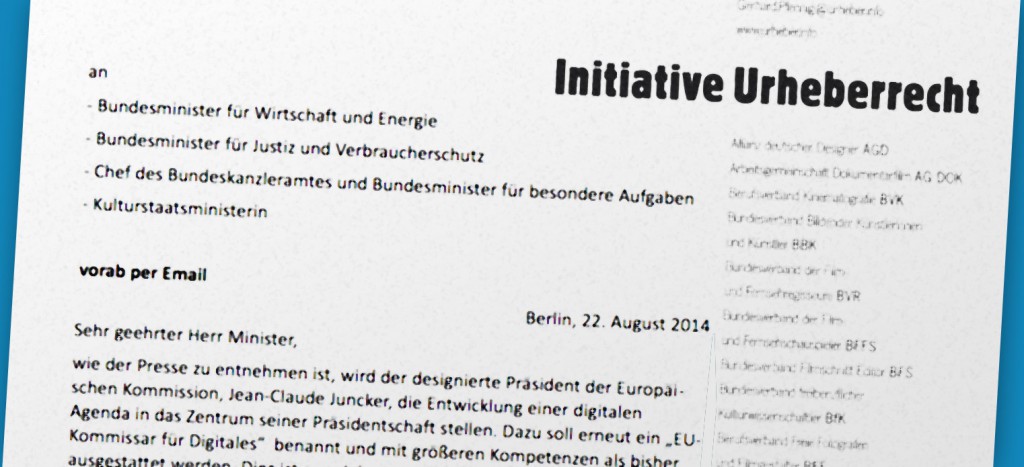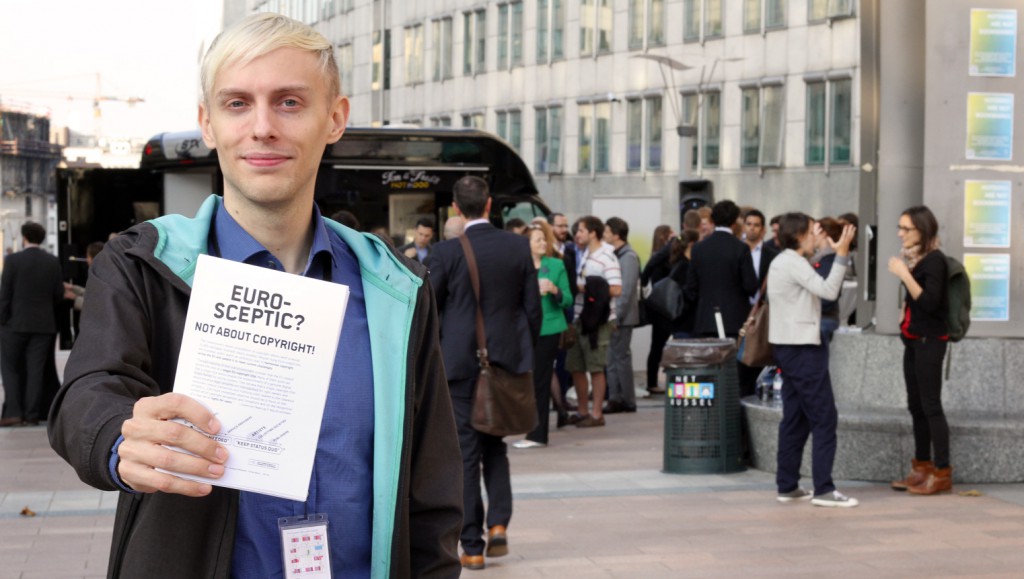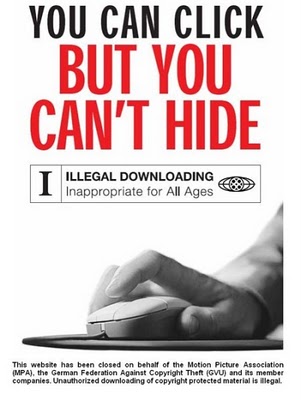Digital frontiers within the EU could be dismantled if copyright is unified across Europe – a proposal that thousands of Europeans recently voiced in an EU consultation. This prospect is raising alarms at rightsholders’ and distributors’ associations. They have begun to take steps to obstruct it.
Currently, European Commission President Juncker is in the process of putting together the new Commission. Ahead of this, the German Initiative Urheberrecht (“Copyright Initiative”) appealed to several German government officials. In a letter, they urged the government not to allow copyright to fall under a digital, rather than an economic Commission portfolio – as Juncker is reported to be contemplating. They also attacked outgoing Commissioner Kroes, who has spoken out in support of copyright unification and reform.

Keeping copyright a commercial matter
If the competencies were reassigned, copyright law would be “made subordinate to technical requirements”, Initiative Urheberrecht claimed. In fact, the inverse is true: If copyright stays under the auspices of a Commissioner primarily concerned with economic matters, the vision of an open digital society risks playing second fiddle to commercial interests.
Junckers plan to create a Vice Presidency for the Digital Agenda with wider responsibilities is plausible and timely. Once, only people (and especially companies) who owned a printing press had to care about copyright law. Today, it affects everyone who has Internet access in their daily lives. In recent years, there have been calls to establish censorship infrastructure and to curtail individuals’ control over their technical devices in the name of copyright protection. This clearly demonstrates: The copyright debate is part of a larger discussion on the distribution of power in the information society. The reconciliation of the interests of creators and users must be addressed within that larger context.
Nobody wants copyright law to purely follow “technical requirements” – but it also may not inhibit social progress that the digital revolution has made possible. The Initiative asserted that the development of the information society depends on content made by “creators”. But this term no longer just comprises “performers, publishers as well as producers and media companies”. The open source programmer, the video-blogging teenager, the innovative app development studio, the voluntary Wikipedia editor – all of them move information society forward, and all of them can find their efforts hampered by copyright law today.
In the information age, being able to interact with new media in empowered ways without constantly encountering legal uncertainties is not just a legitimate interest, but a necessity. It must not be limited in defense of traditional business models, but must rather be protected and supported by governments.
Stagnation as goal
But there is another reason, one not mentioned in the letter, that some insist the copyright file must remain in the hands of the “Internal Market” directorate: Its unwillingness to enact reforms. This was clearly demonstrated in Spring, when a draft of their utterly unambitious white paper leaked. It was only because of the protests of other directorates that the document was not released by the Commission. Since the established players that make up the Initiative Urheberrecht stand to profit most from the status quo, their preference for the least ambitious directorate is only logical.
A similar tune is being sung by Creativity Works, a federation of rightholders’ associations on the EU level. Over the free beer and hotdogs they served in front of the parliament last week, their message was: We are an essential sector of the economy, keep your hands off us or bad things will happen. Just how bad? Very bad:
„The only ‘new’ business models proposed are to rely on voluntary donations, private benefactors, brand partnerships, or, in some cases, government hand-outs. This is anything but progress – it’s a return to begging, corporate feudalism or communism.“ —Helienne Lindvall
My team didn’t hesitate to join the hotdog lobbying party to make sure the message of the consultation was heard: Europeans demand harmonisation and reform of copyright law. (See our flyer)

Call for reform by commissioner Kroes
The outgoing EU Commissioner Neelie Kroes spoke lucidly on this in July:
„Today, the EU copyright framework is fragmented, inflexible, and often irrelevant. It should be a stimulant to openness, innovation and creativity, not a tool for obstruction, limitation and control.“Tweet this!
She listed four goals that copyright must reconcile:
- Promote creativity and innovation
- Remunerate and reward creators
- Not hinder a digital single market
- Take the needs of society and users into account
Not a very radical view. Nevertheless (while avoiding mentioning her by name) the Initiative Urheberrecht claimed in their letter that Kroes had called the entire “area of copyright law” irrelevant. That listing specific goals for a matter is irreconcilable with deeming the whole concept irrelevant is a fact seemingly lost on them.
In a blog post, the speaker of the Initiative deals a low blow: Kroes’ true motivation may be “to give back to the providers on whose toes she stepped with her telecom policy”, he speculates. He casually dismisses the Commission’s copyright consultation, which saw one of the highest participation rates of any consultation yet, as a “pretend-democratic, token survey”.
Kroes, on the other hand, sees a clear mandate for action:
“Here in the EU we have done preparatory work, dialogues, public consultations, legal and economic studies. We have endlessly assessed, examined, analysed. Now it’s time to act.
It is time to show that Europe can deal with the issues people care about. With the possible exception of roaming charges, our copyright rules are perhaps the greatest example, the one that most frustrate ordinary citizens. The thing you just cannot explain.”
If the copyright lobby has their way, this is how it shall remain for the forseeable future.
But it’s not everywhere that lobbies are opposing harmonisation: The Austrian “Verein für Antipiraterie” (Association for anti-piracy – whose largest member is the US film lobby MPAA, known for their excessive scare-mongering ) recently voiced their support for the pan-european introduction of one particular copyright-related provision: Web blocking.
) recently voiced their support for the pan-european introduction of one particular copyright-related provision: Web blocking.
To the extent possible under law, the creator has waived all copyright and related or neighboring rights to this work.